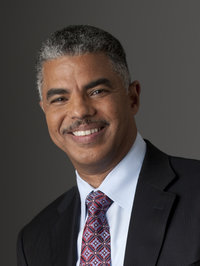Mary Thomas
Advertising Staff
[email protected]
UNC Asheville hosted Keith Woods, National Public Radio’s vice president for diversity in news and operations, to discuss the importance of having a conversation about diversity within journalism on Oct. 6.
“The conversation I want to have with you is about the value and significance of diversity overall. Understand that I come at this very specifically from a journalistic place, but the issues, the values translate perfectly across the spectrum of communications no matter really where you are. It’s just a matter of tweaking the language and focus of that conversation to find that place in your area,” Woods said.
Woods said the conversation about issues with the public and with journalists begins at the core of diversity.

“The problem with that frame is that it always seems that we are always talking about someone else. It’s not always going to be about the other, it’s always going to be about us as a whole. And that’s one of the challenges about talking about differences in the conversation about diversity,” Woods said.
Woods said that in order to tell the full story, all sides of the argument must be heard in order for the public to truly understand the issue.
“You know, the conversation about race has to be a conversation that includes white people, or we’re really not having a discussion. A conversation about women has to include men because the reason you’re having this discussion about the way women fare in our society is because of men.”
Woods discussed a short segment from the NPR podcast, Code Switch, in which the idea of being a good or a bad immigrant was related back to how journalists should cover hard issues.
“One of the things that journalism allows us to do, when we do it well and I don’t think we always do, is climb into that question and show us ourselves. Say, ‘Here public, you may think you’re someone else, but this is who you really are,’” Woods said.
Woods said journalists have an obligation to provide good storytelling in a way that speaks for everybody and not just a select few.
“In our society today, we don’t get the full story for everybody and that’s one of our biggest societal problems. We learn only some things about some segments of our society. We don’t get the full complex picture,” Woods said.
Woods said an example of this struggle in journalism is when a woman runs for political office and is normally met with questions regarding her family life rather than her political life.
“Diversity means understanding those dynamics in our work, understanding that impact on our storytelling,” Woods said.
Woods explained journalists should always divulge the complexities to the community so they can be as informed as possible.
“Complexity is truth. Leave it out on these big issues in our society and you will fail the public because they will not know enough to know what to do about it. That’s what is wrong with our political discourse with Trump and that is what is wrong with a lot of our journalism,” Woods said.
Woods said within a diverse community, people would be better to keep their prejudices in check, even if they don’t think they have any.
“One of the big lessons that I am trying to learn, and I think that this is a human challenge, is to know that is in existence and to figure out a way to artificially inject into your thinking, a challenge to your thinking. If you go by instinct everyday, it will not happen. You have to overcome yourself to do this. I can overcome what ever resides in me, if I know it is there,” Woods said.


















